By Lucy Komisar
Wendy Wasserstein’s play about the impact of feminism on women is troubling for a feminist. The movement has attempted to persuade women that the essence of their destiny and dignity is not writ out biologically as wives and mothers, but as self-fulfillment with choices in the same wider world as men.
Wasserstein was an accomplished playwright, so she was a poster-child for a successful woman. Yet The Heidi Chronicles, her signature play about feminism, is a gut-wrenching disappointment.
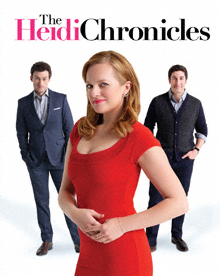
The heroine is a woman who keeps a decades-long connection to a womanizer, gives up a college appointment in order to remain in town to be available to a gay male friend, and finally seeks fulfillment by adopting a baby.
Yet, another woman who becomes a successful film executive is ridiculed. If feminism means empowering women, joyously, this play is the enemy.
Even the show‘s Playbill cover photo, with Elizabeth Moss as protagonist Heidi Holland showing unnecessary cleavage in a form-fitting dress (which she doesn’t wear on stage), looks like it‘s promoting a sexy sitcom, not a feminist play. Or maybe it’s about feminism’s failure to overcome many women’s views that their self-worth depends on how they look.
Wasserstein’s work, which premiered in 1988, is about women who were smart and educated and knew they had to fulfill their own goals, but still got stuck in the I need a man syndrome. It was supposedly about the difficulties women had doing and having it all.
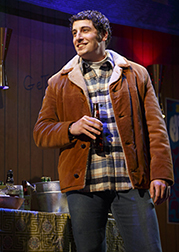
Plenty of women succeeded in finding their selves and destinies as independent human beings. Wasserstein focuses on women still stuck in the pre-feminist trap. Worse, she puts down women who seek fulfillment in the wider world.
In the play, with a lively staging by director Pam McKinnon, Heidi is an art history professor giving a lecture, with slides, on women painters of past centuries, “famous woman painters not mentioned in your textbook.” A good start.
Flashback to a high school mixer when her friend Susan (Ali Ahn) stuffs tissues in her bra and hikes up her skirt. A guy comes over to Heidi and announces he is student council president. She says she is editor of her school paper. Touché. She brushes him off and takes out a book. Probably her most feminist action of the play.
But then there‘s a Eugene McCarthy campaign moment in Manchester, N.H. Heidi goes off to bed with Scoop Rosenbaum (Jason Biggs), the arrogant young guy who has just insulted her. If you think her consciousness gets raised enough to stop such foolishness, you would be wrong.
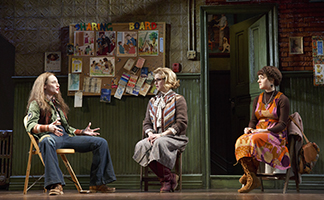
At an Ann Arbor feminist consciousness-raising session, the women arrange chairs in a circle and then talk about their lives.
One says they have to believe that what they want is as important as what men want. Hey, that was revolutionary at the time. But about Scoop, check. Heidi thinks he‘s a creep, “But he‘s a charismatic creep.” Male charisma 1, feminism 0.
We get to some important history, the Women‘s Strike of 1971. There‘s a protest at the Art Institute of Chicago. Peter Patrone (Bryce Pinkham), who joins it, is now a med student. He is self-obsessed. That‘s what boys do, get high-powered professional degrees and think about themselves. Peter also announces that he is gay and has a lover. Heidi? No such luck. She acknowledges that she‘s not involved with Scoop, just sleeping with him. The only thing feminist about that scene was the large NOW poster.
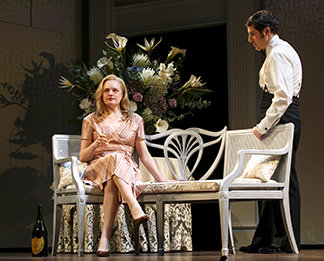
There is such lack of empathy between Heidi and Scoop, it seems unlikely he would want such a connection to her. Unless it‘s a desire to continue the conquest, to prove he can, which is what womanizers do. Her reason? Foolish choices?
By now Scoop is a junior associate at Sullivan & Cromwell. Heidi and Peter go to Scoop‘s wedding at the ritzy Pierre Hotel. Peter jokes about the bride getting a $10,000 M.R.S. degree. Yes, that was a common quip. Scoop says he wouldn‘t marry Heidi, because she wants the same as he does – self-fulfillment. “Then you‘d be competing with me.”
Fast forward. “Imagine” is playing. John Lennon has been shot. It‘s 1980. Yes, the 80s, which should have been the moment that women were imbued with the feminist 70s.
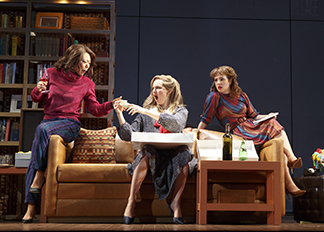
Scoop‘s wife Lisa (Leighton Bryan) has a baby shower. Betsy (Chimo), also pregnant, says, I like men. But they‘re really not very nice.
There’s a half-funny sitcom-style New York upper middle class inside joke. Lisa asks, Why did Patti leave so early? Betsy says, Patti‘s daughter didn‘t get into kindergarten at Ethical Culture and now Charlie‘s making the entire family go into therapy. (For non-New Yorkers: Ethical Culture is an Upper West Side non-theistic congregation attended largely by secular Jews.)
Then a subtly ironic scene where Heidi, Scoop and Peter are on a TV panel to talk about everything from the 60s to Reagan to their lives and work. And the death of the ERA, ie the failure of the Equal Rights Amendment to pass enough state legislatures. (Is this a hint that the play is about the failure of feminism?)
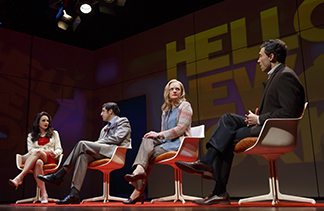
Her fellow panelists keep interrupting her, not letting her get a word in edgewise. Even when the moderator addresses her, one of them cuts her off.
OK, that‘s consciousness-raising for the audience, but why didn‘t a feminist Wasserstein have Heidi sweetly (in character) talk over them or (politely) tell both of them to shut up? Heidi has no backbone.
We find out what Wasserstein thought of women who climbed the system‘s ladders into tough “male” jobs. (Not art historian.) After all, she did. Susan becomes VP for a film production company. She is tough, acerbic. She has hired Lisa‘s sister Denise (Elise Kibler) as her assistant.
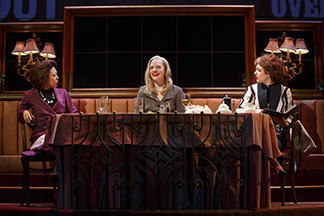
We see her at a trendy New York restaurant lunching with Heidi. What‘s the girl talk? Men. Not working out for either. Except that Susan wants to make a situation comedy about women. But, we are seeing one, aren‘t we?
By 1987, Heidi is sad, dissatisfied, and gives a silly lecture to her old prep school alumnae association (she was a rich girl, as was Wasserstein) on the topic, “Women, Where Are We Going?”
Turns out that the woman who gives lectures on ignored female artists is still pretty traditional. Her epiphany is that she needs a child.
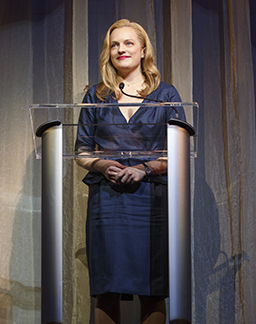
So here’s a play that seems to be about women struggling in the age of feminism, but not getting beyond seeing the ultimate female success as being a wife and/or mother. At 48, Wasserstein became a single mother. Maybe that was her view all along. It’s dated. A contemporary play about women’s lives would have gotten beyond that.
I liked Ali Ahn as Susan, going from a giggly teen to a confident executive. Also Elise Kibler as her assertive assistant. Bryce Pinkham was fine as the sensitive Peter, and Jason Biggs was appropriately outrageous as Scoop. I didn‘t think Elizabeth Moss had enough presence as Heidi, but maybe that was the point.
“The Heidi Chronicles.” Written by Wendy Wasserstein; directed by Pam MacKinnon. Music Box Theatre, 239 West 45th St. (Btwn. Broadway & 8th Ave.) New York City. 212-239-6200. Opened March 19, 2015. 4/8/15.
Play was an open run, but April 21 producers announced a May 3 closing. Maybe today’s women don’t like anti-feminist plays.
Lucy Komisar was a national vice-president of NOW 1970-71 and author of The New Feminism (New York: Franklin Watts, 1972; Paperback Library, 1972).


Excellent critique.
(Brownmiller is the author of “Against Our Will,” the ground-breaking book about rape.)